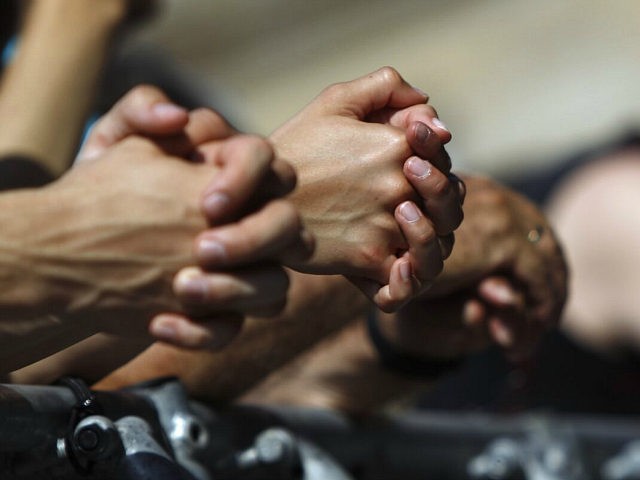WASHINGTON, D.C. — Christian persecution extends beyond Muslim-majority countries into predominantly Christian Russia, where non-Orthodox Church adherents face “strong discrimination,” reveals a report titled “In Response to Persecution.”
“In most of these countries, Christians are small minorities lacking demographic strength and political clout. There are exceptions, such as Russia; there, while the majority is Orthodox Christian, minority Christian churches and religious sects experience strong discrimination,” notes the study, issued by the University of Notre Dame’s Under Caesar’s Sword project on global Christian communities.
The study was released during a symposium at the National Press Club Thursday as Russian news agencies reported that the Kremlin’s Supreme Court has deemed the U.S.-based Christian denomination known as Jehovah’s Witnesses (JW) an “extremist” organization and must relinquish over all its property to the Kremlin.
“Under Vladimir Putin, the relationship between the Russian Orthodox Church and the Russian state is the closest it has been since the Tsarist period. Suffering as a result are non-Orthodox Christians, who make up less than 5 percent of the Russian population and comprise a wide range of Protestants, Catholics, Mormons, and Jehovah’s Witnesses,” notes the report.
“Whereas persecution is not as overt as it is in China or Saudi Arabia, national, regional, and local governments in Russia nevertheless strongly curtail religious freedom. The main objective is to curb the growing numbers and vitality of evangelicals and the support from the West that some enjoy,” it continues.
Russia is home to one of the largest Christian populations in the world.
Members of the Russian Orthodox Church make up the largest segment of the overall population — between 15 and 20 percent, according to the CIA World Factbook.
In the predominantly Muslim former Soviet Republics in Central Asia, the Russian Orthodox Church works with local governments and Muslim leaders to oppress other Christians.
Referring to Central Asian countries, the persecution report points out:
Governments use registration requirements, laws against missionaries, and laws against the religious education of youth to suppress those churches they regard as threats, while exercising comparative leniency towards and forging strategic alliances with the Russian Orthodox Church and mainstream Muslim leaders. Heavy discrimination also takes place against Christians at the hands of local populations in the form of exclusion from jobs, harassment, and subjection to violence.
Despite being a predominantly Christian country, non-Orthodox Christians face persecution in Russia.
“One unsettling form of repression is the political uncertainty that comes in the form of selective and uneven protection of Christian communities,” points out the persecution study released Thursday. “A 1997 law made church registration difficult and clamped down on missionary activity, and a 2012 law restricted the receipt of foreign funds. Such legislation is used to prohibit and prosecute religious activities.”
“For instance, in April 2015, a Baptist pastor in Crimea was jailed for street evangelization and released after three days,” it adds. “He was one among many across the country who have been harassed. Other forms of repression consist of state harassment and public vilification of certain churches.”
In recent months, Russia has mostly focused on tormenting members of Russia’s Jehovah Witness community.
“Russian authorities have put several of the group’s publications on a list of banned extremist literature and prosecutors have long cast it as an organization that destroys families, fosters hatred and threatens lives,” reports Reuters.
“The group, a United States-based non-trinitarian Christian denomination known for its door-to-door preaching and rejection of military service and blood transfusions, says this description is false,” it adds.
Jehovah’s Witnesses (JW) have faced persecution by the likes of Germany’s Nazi dictator Adolf Hitler and Cuba’s Communist dictator Fidel Castro.
Another set of challenges faced by non-Orthodox religious groups such as JW “is the state’s inordinate provision of financial and legal support to the Russian Orthodox Church, a pillar of national identity, which amounts to a form of discrimination against small non-Orthodox churches who lack this funding source,” reveals the persecution study.
Minority Christian churches in Russia “are keen to demonstrate that they are not tentacles of the West, a charge commonly laid on them by nationalistic Russians. In some cases, churches take up a more survivalist response of ‘going underground’ and meeting in secret,” it adds.
According to the report, most Christians employ non-violence when responding to persecution.
“Christian responses to persecution are almost always nonviolent and, with very few exceptions, do not involve acts of terrorism,” it states.
Christian persecution is not limited to oppressive regimes.
“Perhaps surprisingly, democracies sometimes host and even enable violence and harsh discrimination toward Christians,” notes the report. “India, the world’s largest democracy, though it has a well-earned reputation for religious peace and healthy pluralism, has elected a Hindu nationalist government with close ties to militant groups that foment violence against the country’s minority Christians and Muslims.”

COMMENTS
Please let us know if you're having issues with commenting.